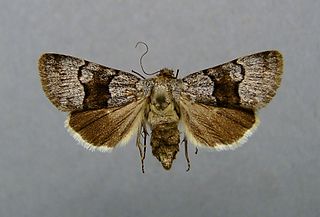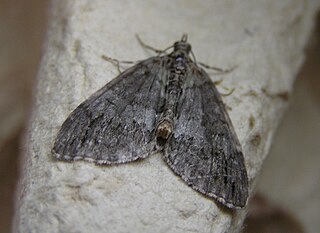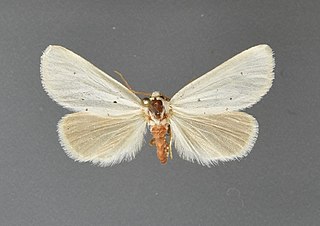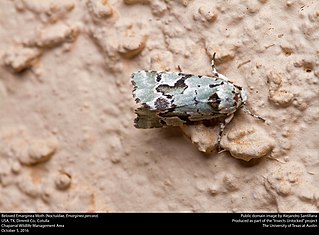
Idia is a genus of litter moths of the family Erebidae first described by Jacob Hübner in 1813.

Renia is a genus of litter moths of the family Erebidae erected by Achille Guenée in 1854.

Euxoa is a genus of moths of the family Noctuidae raised by the German entomologist, Jacob Hübner. This genus includes the prolific miller moths, which are full adult army cutworms labeled as the species Euxoa auxiliaris and common in North America.

Grotella is a genus of moths of the family Noctuidae first described by Leon F. Harvey in 1875.

Sympistis is a genus of moths of the family Noctuidae. The genus was erected by Jacob Hübner in 1823.

Hydriomena is a genus of moths in the family Geometridae described by Jacob Hübner in 1825.

Grotella parvipuncta is a moth in the genus Grotella, of the family Noctuidae. The species was first described by William Barnes and James Halliday McDunnough in 1912. This moth species is found in North America, including New Mexico, its type location.
Schinia aetheria is a moth of the family Noctuidae first described by William Barnes and James Halliday McDunnough in 1912. It is found in North America, including Arizona, Nevada, New Mexico and Utah.

Idia diminuendis, the orange-spotted idia, is a litter moth of the family Erebidae. The species was first described by William Barnes and James Halliday McDunnough in 1918. It is found in North America from Wisconsin to Nova Scotia, south to Florida and Texas.
Idia julia, or Julia's idia, is a litter moth of the family Erebidae. The species was first described by William Barnes and James Halliday McDunnough in 1918. It is found from southern Canada south to Georgia and Texas.
Idia parvulalis is a species of litter moth of the family Erebidae first described by William Barnes and James Halliday McDunnough in 1911. It is found in North America, including its type location, the Santa Catalina Mountains in south-eastern Arizona.
Alpheioides is a genus of snout moths. It was described by William Barnes and James Halliday McDunnough in 1912, and contains the species Alpheioides parvulalis. It is found in North America, including southern California, Arizona and Oklahoma.
Anemosella viridalis is a species of snout moth in the genus Anemosella. It was described by William Barnes and James Halliday McDunnough in 1912, and is known from Mexico and the US state of Arizona.
Decaturia is a monotypic snout moth genus. Its only species, Decaturia pectinalis, is found from California to southern Arizona. Both the genus and species were described by William Barnes of Decatur, Illinois, and James Halliday McDunnough in 1912.
Lycomorpha splendens is a moth of the family Erebidae. It was described by William Barnes and James Halliday McDunnough in 1912. It is found in North America, including Arizona, California, Nevada, New Mexico, Texas and Utah.
Givira cleopatra is a moth in the family Cossidae first described by William Barnes and James Halliday McDunnough in 1912. It is found in North America, where it has been recorded from Arizona, California, Nevada and Utah.

Eudonia spaldingalis is a moth in the family Crambidae. It was described by William Barnes and James Halliday McDunnough in 1912. It is found in North America, where it has been recorded from Alberta, Arizona, British Columbia, California, Colorado, Montana, Nevada, New Mexico, Utah and Wyoming.
Stiriini is a tribe of owlet moths in the family Noctuidae. There are at least 120 described species in Stiriini.

Psaphidini is a tribe of owlet moths in the family Noctuidae. There are at least 40 genera and at least 90 described species in Psaphidini.

Chalcopasta fulgens is a moth in the family Noctuidae. It was described by William Barnes and James Halliday McDunnough in 1912 and is found in North America.









